Kia Sportage: Description and Operation
Limitations Of The Navigation system
GPS Signal Reception State
As the GPS satellite frequency is received/transmitted in straight lines, reception may not work if hiding devices are placed on or near the GPS antenna or when traveling though the following locations.
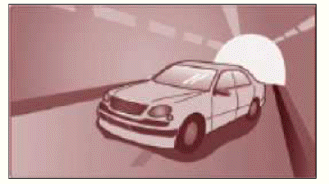
- Tunnels
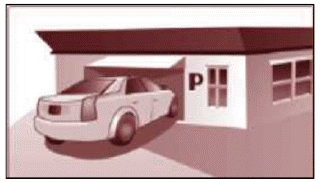
- Basement parking structures
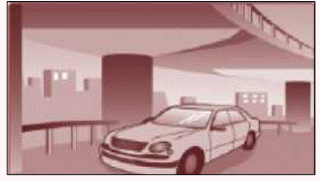
- Underneath an overpass
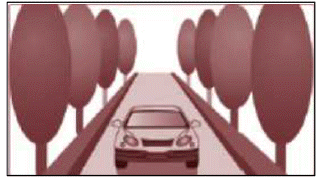
- Roads within forested areas
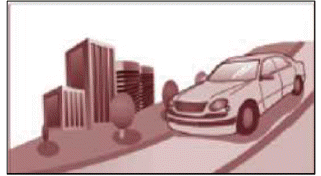
- Areas near high rise buildings
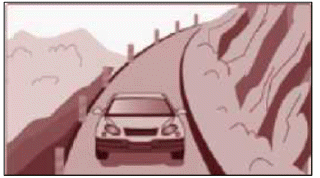
- Roads within canyons
Vehicle Position Display
1. If multipass errors occur due to reflections from buildings or related causes, the current position mark on the navigation may differ from the actual position of the vehicle.
2. The position of the vehicle on the navigation may be different from the actual position if the vehicle is under the occur, driving for a short period of time will vehicle through map matching or GPS information (several minutes may be necessary in certain cases).
- When driving on a Y-shaped road with a narrow angle, the current position may be displayed in the opposite direction.
- If the vehicle is loaded onto a car transport vehicle, the current positron mark may be stalled on the last position prior to loading.
- When driving on a spiral-shaped road.
- When driving in mountain regions with sharp turns or sudden brakes.
- When entering a road after having been in an underground parking structure, building parking structure, or turnable with marry rotations.
- When the tires have recently been replaced (Especially upon use of spare or studless tires)
- If the battery terminal is removed.
- When driving in city streets, the current position may be displayed on the opposite side or on an off-road position.
- When changing the zoom level from the maximum zoom in level to a different zoom level, the current position mark may be displayed on a different road.
- When driving in heavy traffic with frequent go stops in traffic or intersections.
- When driving under slippery conditions, such as heavy sand, snow, etc.
- When driving with the tire chain in place.
- When using a tire with an incorrect size specification.
- When the tire pressure for the 4 tires are different.
- When the replacement tire is a worn or used tire (Especially studless tires having passed a 2nd seasons, etc.)
- When driving near high-rise buildings.
- If a roof carrier has been installed.
- When driving wider high speeds or having calculated a long-distance route.
Route Guidance
Suitable route guidance may not occur caused by search conditions or the driving position.
- Guidance to go straight may be given while driving on a straight road.
- Guidance may not be given even when having turned at an intersection.
- There are certain intersections in which guidance may not occur.
- A route guidance signaling entrance into a no enter zone may occur (No enter zone, road wider construction, etc.)
- Guidance may be given to a position removed from the actual destination if roads to reach the actual destination do not exist or are too narrow.
- Faulty voice guidance may be given if the vehicle breaks from the designated route (ex: if a turn is made at an intersection while the navigation provided guidance to go straight).
- Map Data may be missing or incorrect causing route guidance to not be given.
Route Re-calculation
The following phenomena may occur after conducting route recalculation.
- Guidance may be given to a position differing from the current position when turning at an intersection.
- Route recalculation may take a longer period of time when driving wider high speeds.
- A route guidance signaling for a U-Turn in a No U-Turn location may occur.
- A route guidance signaling entrance into a no enter zone may occur (No enter zone, road wider construction, etc).
- Guidance may be given to a position removed from the actual destination do not exist or are too narrow.
- Faulty voice guidance may be given if the vehicle breaks from the designated route (ex: if a turn is made at an intersection while the navigation provided guidance to go straight).
READ NEXT:
 Repair procedures
Repair procedures
Removal
NOTE
Take care not to damage and scratch the hazard lamp switch assembly and
its related parts.
Apply the protective tapes to the hazard lamp switch assembly and its related
parts.
1
 AUX (Auxiliary) Jack
AUX (Auxiliary) Jack
Description and Operation
Description
The multimedia jack on the console tipper cover is for customers who like to
listen to external portable music
players like the MP3, iPod and etc., thr
SEE MORE:
 Driver Attention Warning settings
Driver Attention Warning settings
Basic function
Driver Attention Warning will help determine
the driver's attention level by analyzing
driving pattern, driving time, etc.
while vehicle is being driven. Driver
Attention Warning will recommend a
break when the driver's attention level
falls below a certain level.
Le
 Battery
Battery
Description and Operation
Description
1. The maintenance-free battery is, as the name implies, totally maintenance
free and has no removable battery cell
caps.
2. Water never needs to be added to the maintenance-free battery.
3. The battery is completely sealed, except for small ven
Content
- Home
- Kia Sportage - Fifth generation (NQ5) - (2022-2025) - Owner's Manual
- Kia Sportage - Second generation (JEKM) (2005-2015) - Body Workshop Manual
- Kia Sportage Third generation (SL) - (2011-2016) - Service and Repair Manual
- Sitemap
- Top articles